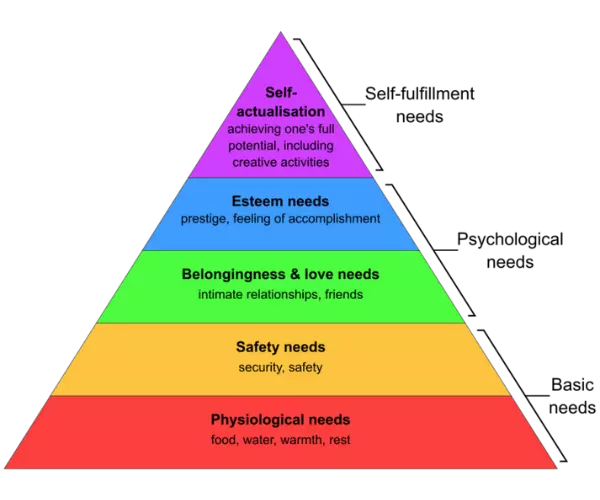Hierarchy of Needs: Inspiring Motivation in Your Team

"O son of Pṛthā (Kunti), there is no work prescribed for Me within all the three planetary systems. Nor am I in want of anything, nor have I a need to obtain anything – and yet I am engaged in prescribed duties." Bhagavad Gita 3.22
Lord Krishna nicely explains four different strategies to make someone deliver their prescribed duties in the above sloka. They are Sense of Responsibility, Wants, Needs and Sense of Ownership in the increasing order of effectiveness.
Maslow’s Need Theory is a famous theory commonly used in motivation trainings for understanding and enabling motivation in humans.
In a 1943 paper titled "A Theory of Human Motivation", American psychologist Abraham Maslow theorized that human decision-making is undergirded by a hierarchy of psychological needs. Maslow proposed that five core needs form the basis for human behavioral motivation. These needs cover the commonly trumpeted physiological needs roti, kapada and makaan and higher layers of psychological needs. The hierarchy of needs are physiological needs, safety needs, love and belonging needs, esteem needs, and self-actualization needs.
Maslow's theory presents the hierarchy of needs in a pyramid shape, with basic needs at the bottom of the pyramid and more high-level, intangible needs at the top. A person can only move on to addressing the higher-level needs when their basic needs are adequately fulfilled.
Jump To Section

Earn As You Learn
Earn 25% commission when your network purchase Uplyrn courses or subscribe to our annual membership. It’s the best thing ever. Next to learning,
of course.
Physiological Needs
The first of the id-driven lower needs on Maslow's hierarchy are physiological needs. These most basic human survival needs include food and water, sufficient rest, clothing and shelter, overall health, and reproduction. Maslow states that these basic physiological needs must be addressed before humans move on to the next level of fulfilment. Organizations heavily focus on this by offering adequate Salary and increments, Tea/Coffee, Lunch, Health benefits, etc.
Love and Belonging Needs
The social needs on the third level of Maslow’s hierarchy relate to human interaction. Among these needs are friendships, family bonds, camaraderie, belongingness, etc. Many organizations nowadays focus on this layer and have a well-developed function of Human Resources known as 'Talent Engagement' to identify and address these needs.
Taking care of higher layers of the hierarchy of needs are the primary responsibility of each leader in an organization. What are they?
Esteem Needs
The higher needs, beginning with esteem, are ego-driven needs. The primary elements of esteem are self-respect (the belief that you are valuable and deserving of dignity) and self-esteem (confidence in your potential for personal growth and accomplishments). Appreciation of good work and developing self-confidence are essential enablers for esteem needs.
Leaders Play a Major Role in Recognizing and Nurturing These Needs in Their Team
Organizations build a culture of recognizing and nurturing Esteem Needs and Self-actualization needs but the leaders play a major role in recognizing and nurturing these needs in their team. One can expect full potential from the employees only if all the 5 groups of needs are taken care of and not just the physiological needs.
Maslow referred to self-actualization as a “Growth Need”, and he separated it from the lower four levels on his hierarchy, which he called “Deficiency Needs”. According to his theory, if you fail to meet your deficiency needs, you’ll experience harmful or unpleasant results. Even 'Esteem Needs' are included in the category of 'Deficiency Needs'. The negative effect will be higher if a human is disrespected, ridiculed and/or put down in front of others. By contrast, self-actualization needs can make you happier, but you are not harmed when these needs go unfulfilled. Thus, self-actualization needs only become a priority when the other four foundational needs are met.
Crave for the needs would be there in different proportion in different humans but it has to be clearly understood that every human longs for fulfilment of all the grops of needs and the efforts taken to understand the needs and fulfilment of these needs go a long way in boosting motivation of the employees.
Is there Anyone who is an Exception to Maslow’s Theory?
One who is always motivated not bothering about any of these needs. Maslow says No, but Lord Krishna says Yes.
Krishna says in the above sloka that he is not bound by any job definition, he has no wants and no needs, but he is sincere in discharging his duties. Can we create people like Krishna who discharge their responsibilities without the fear of punishment and without weighing every action against their wants and needs? Don’t we need more such people in our teams?
This is in your hands. You need to build Sense of Ownership to make that happen.
If you want to request a Mentoring session, please click here.


Leave your thoughts here...
All Comments
Reply